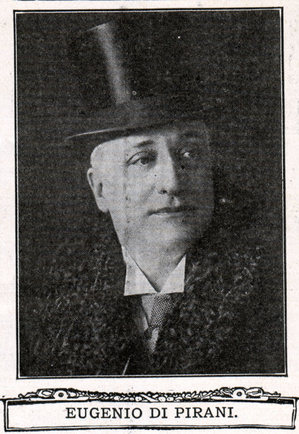 Eugenio di Pirani was born at Ferrara, Italy, September 8, 1852. He studied at the Rossini Lyceum at Bologna, at the same time acquiring a general education at the Galvani Lyceum. His parents wanted him to be a lawyer, but without saying anything to anybody he entered into a competition for a professorship in advanced piano playing at the Kullak Conservatory in Berlin. To his surprise he won, and remained in Berlin many years. While there he studied composition with Friedrich Kiel. Mr. di Pirani made a European concert tour in 1902 in company with Mme. Webster-Powell, and in 1904 came to America and located in Brooklyn, where in company with Mme. Powell he founded the Powell and Pirani Musical Institute. Besides being an excellent virtuoso and teacher, Mr. di Pirani is a composer of a high order, among his more elaborate works being the Heidelberg Suite, Venetian Scenes (for piano and orchestra), and two operas—one of them with an American theme. He has also compiled a work on piano playing.
Eugenio di Pirani was born at Ferrara, Italy, September 8, 1852. He studied at the Rossini Lyceum at Bologna, at the same time acquiring a general education at the Galvani Lyceum. His parents wanted him to be a lawyer, but without saying anything to anybody he entered into a competition for a professorship in advanced piano playing at the Kullak Conservatory in Berlin. To his surprise he won, and remained in Berlin many years. While there he studied composition with Friedrich Kiel. Mr. di Pirani made a European concert tour in 1902 in company with Mme. Webster-Powell, and in 1904 came to America and located in Brooklyn, where in company with Mme. Powell he founded the Powell and Pirani Musical Institute. Besides being an excellent virtuoso and teacher, Mr. di Pirani is a composer of a high order, among his more elaborate works being the Heidelberg Suite, Venetian Scenes (for piano and orchestra), and two operas—one of them with an American theme. He has also compiled a work on piano playing.Among other things, Mr. di Pirani, in his varied career, has acquired some amusing experiences. He related the following incident to an interviewer from Musical America some time ago. “My first important debut was in London. I had a letter of recommendation from the Empress of Germany to Sir Michael Costa. I found him shaving. He called out roughly, ‘I don’t know you, but that letter is so dear to me that I will do anything for you. What do you want?’ ‘I want to play at Covent Garden,’ I replied. At that time Sir Michael conducted every month a big concert at Albert Hall of which Mapleson was the manager. To Mapleson we went. Sir Michael walked up to him, and in his blunt way said, ‘This gentleman wishes to play at the next concert. He has been recommended by the German Empress. Let him play.’
“‘Impossible!’ replied Mapleson. ‘The program is made up, the artists engaged.’
“‘Then,’ said Costa. ‘I will resign my post as conductor. I will direct no more.’
“Mapleson immediately yielded. As Sir Michael and I walked away he said to me: ‘It is done.’”



